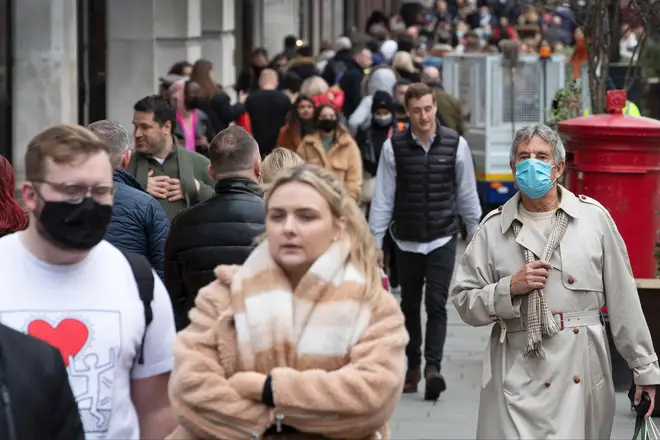
Shelagh Fogarty 1pm - 4pm
17 December 2021, 16:39 | Updated: 17 December 2021, 17:02

Imperial College London scientists have declared booster vaccines are “critical” in order to fight the Omicron Covid wave – though a new jab may be needed in the future.
A new study found boosters, in a worst-case scenario, are 80 per cent effective against severe disease or hospitalisation 60 days after the jab is administered. That drops to 73pc after 90 days.
It compares to the low protection – between 18pc and 35pc – offered by just two doses against severe Omicron illness.
The variant is driving record infections in the UK, with a third successive daily record – of 93,045 cases – set today.

Omicron wave sweeping the UK will ‘peak quite fast’ – Chris Whitty
The report said: “Booster doses will be critical to mitigate the impact of future Omicron waves in countries with high levels of circulating virus.
"They will also be needed in ‘zero-COVID’ countries where there is little prior infection-induced immunity, in order to open up safely.”
However, the study also found neutralising antibodies produced against Omicron could be 4.5 times lower than against Delta, causing a likely waning of effectiveness of the booster over months.
As a result, the report said “all scenarios suggest” either repeated booster jabs, or a new Omicron-specific vaccine, will be needed to restore protection.
Read more: Wales to reimpose Covid restrictions in response to Omicron
Nonetheless, Prof Azra Ghani said that for now, “our results demonstrate the importance of delivering booster doses as part of the wider public health response.
“Prioritising these boosters to high-risk populations over primary vaccination in younger age-groups should be part of this response in countries where dose supply is limited.”
Meanwhile, the other Imperial report published today found no evidence of Omicron infection having lower severity than Delta – as has been suggested in previous studies.
It also found the risk of reinfection with Omicron is 5.4 times greater than Delta, with Prof Neil Ferguson, one of the report authors who has been a leading scientific voice during the pandemic, saying: "This level of immune evasion means that Omicron poses a major, imminent threat to public health."